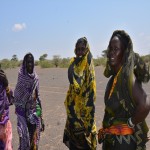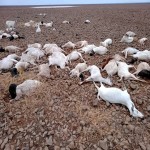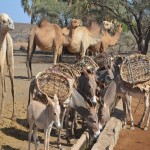
Livestock, which is the mainstay for the people’s livelihoods, have died in their numbers. ‘This
looks like a final stretch towards livestock depletion’ echoes one resident of Dhemo, a small village
in North Horr Sub-County.
Another resident of the same village reminisces with nostalgia rearing livestock in this village.
‘Dhemo is known for being the best place for rearing all species of livestock in Marsabt. The place
had a lot of pasture in the past years. Even during prolonged droughts, Dhemo has for a long time
been a place of refuge for pastoralists. But things have changed,’ he says with his head turning
down. This time round, the place cannot rescuer even people leave alone livestock. We are considering
shifting, but we actually don’t know where to go. Our livestock situation is as you can see.” He
says pointing at a massive hip of animal remains littering the village. “We have never depended
on begging like this time.” He adds.
It is reported that every household has lost at least three quarters of the livestock so far, with a few
families losing hundred percent of their livelihoods, leaving them in distress.These sentiments are also echoed by another woman also a resident who is reported to have lost a
massive amount of Livestock. Sadness written across her face, she recalls having a herd size of
300 cows. “We used to have a good number of Livestock. Cows, goats, sheep and Camels. Now
we have only 8 cows left, 3 of which are already too weak to wake up,” she says pointing at her 3
weak cows, one already making her last kicks.
In a bid to save lives and prevent acute malnutrition, Caritas Catholic Diocese of Marsabit is
providing rations and water to 498 most drought hit households across the County, thanks to Caritas Italiana and Catholic Agency for Overseas Development (CAFOD). The residents have
been receiving food rations for the last few months, thanks to Caritas and other humanitarian
workers in the county.
Residents of Burgabo have for a long time had difficulty getting enough water for both their
livestock and for domestic use. Mr. Jirm is a resident and reports that the village has been suffering
as they had depended on a small borehole drilled by Caritas Marsabit years ago. He reports that
overtime, both human and livestock populations have grown putting pressure on the borehole.
“People used to queue for water for hours-sometimes the whole day. This directly affected the
households lives as children had to wait for long without being breastfed because mothers had to
be on water queues for hours. Also, the water from this small borehole had very high levels of
salt.” He adds “This is however a thing of the past as we have had a new high yielding borehole. Caritas has
recently drilled for us this new borehole. Though the village has also lost most of their livestock,
this borehole is still very high yielding compared to the old one. There are no longer long queues,
women can return home at a reasonable time after fetching water from here. The water quality is
also commendable. In addition, the water is very soft.


